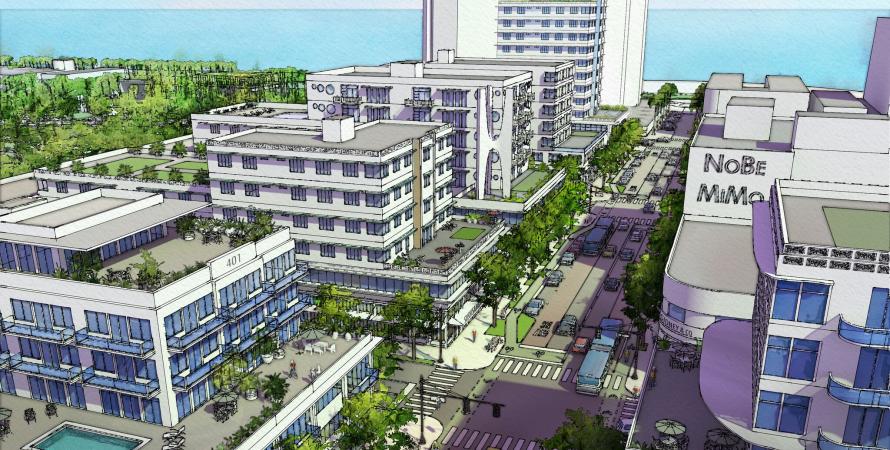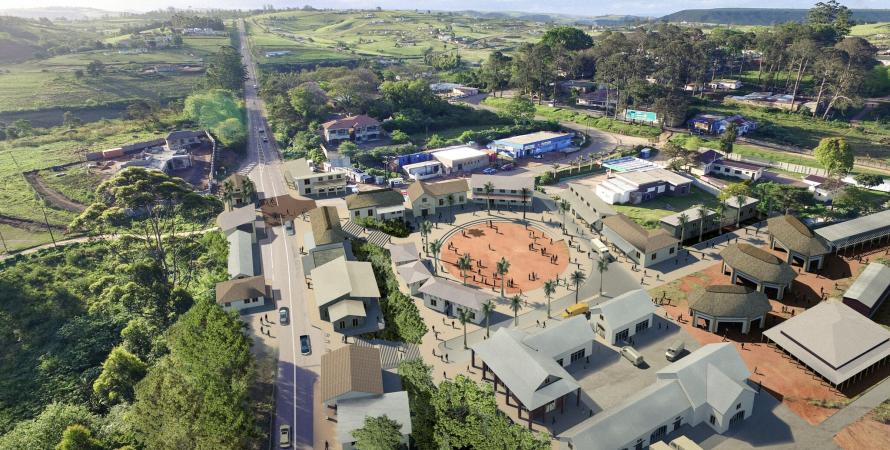The Land Use Action Plan for Atlanta’s Westside builds on the history and tremendous potential of Atlanta’s Westside. While remaining appropriately critical of past planning decisions that have isolated this sector, the Westside Atlanta Plan is rooted in the history of a place that was a cradle of the civil rights movement.
Five Historic Black Schools and Universities have their campuses in the Westside, which was home to Martin Luther King Jr., Julian Bond, and other civil rights leaders. Yet the area now claims the worst statistics per capita in Georgia for drug use, illiteracy, teenage pregnancy, high school dropout rates, domestic violence, murder, and deaths by overdose. These once thriving neighborhoods have seen disinvestment, destruction, and depopulation.

For the Westside Atlanta Plan, the goal is to regenerate 1,700 acres of blighted historic urban fabric less than one mile from downtown while also enhancing a sense of place—and building affordable housing.
The plan envisions 3,250 new housing units, more than half of them a fordable—including 20 percent earmarked for residents with incomes from zero to 30 percent of area median income. Subsidized housing is made possible through private enterprises that are underwriting the financing gap.
Streets are crucial to placemaking, and Westside’s have been systematically severed from downtown. The Action Plan requires the City to repair 20 percent of the streets in the sector with dedicated capital funds. The main east-west corridors, Martin Luther King Jr. Drive and Joseph E. Boone Boulevard are already budgeted for improvements. The recent closing of ML K Jr. Drive to build the new $1.6 billion football stadium was an egregious mistake, the plan notes.
Westside Atlanta proposes a roundabout to move traffic to the south of the stadium and reestablish a downtown link. The roundabout is the focus of mixed-use development that will serve as a gateway to the Vine City neighborhood and the Atlanta University Center.

Additionally, Westside neighborhoods flood regularly due to past engineering and development choices. The plan shows how to improve stormwater management through complete streets and new parks. A new form-based code would preserve neighborhood character and ensure community-oriented development.
This commitment to affordability becomes increasingly important as neighborhoods adjacent to the Historic Westside—including those along Atlanta's Beltline—continue to see rising prices. To counteract the financial burden of rising land values on legacy residents, a local nonprofit, the Westside Future Fund, is helping to ensure that long-time residents aren’t pushed out. The Westside Future Fund’s Anti-Displacement Tax Fund, a resident-driven outcome of the plan, is proof of that commitment. Through philanthropic donations, the fund is bridging the difference between current and rising property taxes so that as they rise, residents can afford to stay in their homes. “The long-time homeowners are the first ones you need to help,” explains City Commissioner Tim Keane. In addition, WFF has been raising philanthropic money to buy and redevelop high-quality rental buildings.
The Westside Future Fund has identified and developed plans for four areas needing simultaneous attention: safety and security, cradle-to-career education, health and wellness, and mixed-income communities. Philanthropic support for their work comes from many of Atlanta’s prominent corporate leaders, including Chick-fil-A Foundation, Home Depot Foundation, Delta Air Lines, SunTrust, Georgia Power, The Coca-Cola Company, Equifax, and Cox Enterprises.
WFF has also partnered with the City of Atlanta and national nonprofit organizations. Working with the City and the Trust for Public Land, WFF is supporting the building of a new park system by refurbishing the existing infrastructure and building new parks of varying scales, with a goal that every Westside resident be within two blocks of a green space. Most notably, the $45 million, 16-acre Rodney Cook Sr. Park opened in May 2017, representing the largest investment in a public park in Historic Westside in more than 50 years. The park is designed to mitigate flooding in Vine City, honor Civil Rights and Native American leaders, and provide amenities such as an amphitheater, picnic pavilion, playground, performance plaza, and public art.
Through the support of several cross-sector partners, the revitalization of the Historic Westside has benefited from several catalytic investments including a $30 million HUD Choice Neighborhood Grant delivered to the City of Atlanta to support the development of additional affordable housing. In 2013, the Arthur M. Blank Family Foundation also made a lead investment of $15 million as part of the Westside Neighborhood Prosperity Fund, followed by an additional $15 million commitment in 2017. The funds are helping to improve Westside neighborhoods, and training hundreds of residents in career-path jobs via Westside Works, which resulted in more than $12.1 million in wages earned by program graduates as calculated in 2018 by WFF. Additionally, the Chick-fil-A Foundation has contributed more than $40 million in funding to Westside organizations. In 2019, Chick-fil-A raised more than $5 million through the Beloved Benefit which will be donated to Westside-based nonprofit partners including the At-Promise Youth Center, Grove Park Foundation, Westside Works, City of Refuge and Westside Future Fund.
“Thomas Edison once said that ‘Ideas without execution are a hallucination. The Westside Future Fund will now champion the execution of the great ideas embedded in the Land Use Action Plan,” said John Ahmann, Executive Director of the Westside Future Fund.
Similar Projects
Plan NoBe
Miami Beach, Florida
For the Miami Beach, FL neighborhood of North Beach, climate change, historic preservation, a fordable housing, and walkability are all interrelated issues.
Ubuntu in Umbumbulu
Ethekwini Municipality, South Africa
When a student at Andrews University returned to his native South Africa to design a low-cost house for a needy family, his journey sparked an eight-day public charrette and design process in eThekwini Municipality—about 25 miles from the city cen
Project Details
Westside Atlanta Plan Atlanta, Georgia
Year
2016
Characteristics
Housing
Infill
Master Plan
Street Design
Charter Award
Charter Award
Charter Award


